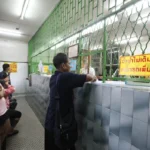BANGKOK – Non-communicable diseases (NCDS) are climbing fast in Thailand. Doctors and researchers point to changes in what people eat as a main cause. More Thais are choosing foods packed with sugar, salt, and fat.
These choices are linked to a jump in obesity, diabetes, heart disease, and other long-term health problems. Right now, NCDS are responsible for about 400,000 deaths each year in Thailand, and they use up more than half of the country’s health budget.
These illnesses don’t just affect people’s health. They cost Thailand over a trillion baht each year and put a heavy load on hospitals and families. Health experts warn that changing how people eat is crucial.
It’s not just about staying healthy—it’s about keeping the economy and health system strong. In this post, you’ll find out how the country’s eating habits led to a health crisis, what it means for everyone, and what’s being done to help Thais make better choices.

NCDS Take Over: The Numbers and the Impact
Non-communicable diseases like heart disease, diabetes, and cancer are now the biggest health threats in Thailand. Fewer people are making meals at home, and convenience foods have become the new normal. Hospitals are stretched, and the cost of care is growing. Looking at the numbers shows why action is so important.
How Bad Is It? The Numbers Behind the Crisis
Over the last ten years, NCDS have increased quickly. More than 33 million people in Thailand are living with at least one NCD, and about 2 million new cases show up each year. Each year, around 400,000 people die from Non-communicable diseases, making them the leading cause of death.
Here are the main types:
- Heart disease and stroke: These top the list for Non-communicable disease-linked deaths.
- Diabetes: Over 6.5 million Thais have diabetes, and this number is rising.
- Cancer: More than 140,000 people are living with cancer, with many new cases each year.
- Chronic lung diseases: These are also among the most common causes of death.
Thailand’s rates of NCDS are some of the highest in Southeast Asia. International health agencies say the situation is urgent, and it’s following a pattern seen in other countries, growing quickly and changing fast.
The cost is huge. NCDS drain more than 1 trillion baht from the Thai economy every year. That’s nearly 10 per cent of the country’s GDP, mostly from health care costs and lost work. The health system now spends more than half its budget treating these diseases, taking away funds needed for other services.
What’s Behind the Numbers? Lifestyle and Health Risks
Non-communicable diseases don’t just appear out of nowhere. Most start with daily habits and build up over time. Diet is a key factor. Many Thais now eat in ways that raise their risk:
- Over half drink sugary drinks and eat sweet snacks at least three times a week.
- Almost half the adults eat salty dishes, like spicy salads, several times a week.
- Fried and processed foods are common, especially among young people.
Obesity is rising, especially among kids and teens. In the last 25 years, rates of overweight and obesity in children have doubled. In 2025, about 13 per cent of kids aged 6-14 are overweight. Among older teens, it’s about 14 per cent. If nothing changes, experts predict over 60 per cent could be overweight by 2035.
It’s not just food. Other problems add to the risk:
- Many people still smoke, leading to more cancer, stroke, and heart disease.
- City life means less movement and more sitting.
- Millions have high blood pressure or are overweight, which can lead to more serious illnesses.
These health problems often show up together. High cholesterol, high blood sugar, and high blood pressure often follow a poor diet and low activity. Nearly 14 million Thais have high blood pressure, and many don’t know until they get sick.
Many people don’t know enough about nutrition. Some are shy about asking for less salt in restaurants, or they don’t realise how much sugar or fat is in their favourite snacks. Only a small number can say how much salt, sugar, or fat is healthy.
As diets change and cities grow, Thailand’s NCD crisis shows what can happen if daily habits don’t improve. If risks aren’t tackled soon, the country will see even higher rates of disease, putting more strain on families and health services.

The Diet Shift Fueling Thailand’s Health Crisis
Thailand once thrived on simple, healthy meals—rice, vegetables, fish, and small amounts of meat. But today, eating habits have changed. City life, long hours, and non-stop marketing mean more convenience foods loaded with sugar, salt, and fat. This shift is doing more than changing culture. It’s adding to the country’s NCD crisis.
City Life and Fast Food Culture
Urban growth has changed how Thais eat. With more people working and less time at home, fast food and ready-made meals are everywhere. These meals are quick and tasty but often unhealthy.
Marketing adds fuel to the fire. Ads for soft drinks, salty snacks, and processed meals target young people and workers, making these foods hard to avoid. Items like instant noodles, fried chicken, and sweet tea are easy to find and often replace healthier options.
Sales of processed foods have soared, a trend that matches other Southeast Asian countries. These foods, often high in refined carbohydrates, fat, and artificial flavourings, can cause health problems. Kids and teenagers are especially interested in snacks instead of fruits and vegetables.
Traditional food markets have a tough time keeping up with modern supermarkets, where fresh food often costs more than processed snacks. This pushes families with lower incomes to choose cheaper, less healthy food. Over time, more homes are stocked with processed foods, moving away from old habits of home cooking and plant-based meals.
Who’s at Risk? The Impact on Vulnerable Groups
Not everyone faces the same risk. People with less money are more likely to eat unhealthy foods because they cost less and last longer. Fresh produce and lean meats can be too expensive for many families. Rural areas and poorer neighbourhoods often have less access to good nutrition information.
Older adults are also at risk. Limited budgets, health problems, and changes in the body can make it hard to get enough healthy food. Many end up eating more processed snacks and instant meals.
Children and teenagers are caught up in the new food culture. Many urban families have replaced balanced, home-cooked food with salty, sweet, and fatty takeout. Food ads with fun characters or influencers pull kids toward unhealthy choices. Without strong guidance, young people pick up habits that can lead to obesity, diabetes, and heart problems later on.
Not everyone has access to good advice about food. Studies show that only a small group, usually those in wealthier areas, really understand what makes a diet healthy. This leaves millions at risk, just because they don’t have the resources or information they need.
Fixing these problems needs more than individual effort. Making healthy food easier to find and afford is key to helping families across Thailand.

Changing Course: Policy Efforts and Ongoing Challenges
Thailand has made the prevention of Non-communicable diseases a national issue. New rules and health campaigns appear each year, but progress is slow. Gaps in regulation and little industry accountability mean many changes don’t go far enough.
Government Action and Public Awareness
The government has required nutrition labels on many packaged foods and added taxes to sugary drinks. Large ads for unhealthy foods must include health warnings. Public health campaigns now focus on teaching people about healthy eating at home, in schools, and restaurants. For example, messages encourage families to use less salt and sugar, while schools try to swap sodas for water and teach students about balanced meals.
Other steps include:
- Easy-to-read nutrition labels on the front of packages.
- Taxes on sweet drinks are to cut down sales, especially among young people.
- Community events with cooking demos and health talks.
But many companies still find ways around the rules, and many unhealthy foods still fill store shelves. According to the World Health Organisation, Thailand’s efforts are a good start, but weak enforcement and loopholes limit their effectiveness.
Unless the government finds ways to close these gaps and apply rules fairly, real change will be slow. Good intentions won’t solve the problem without proper follow-through.
Industry Promises and Missed Targets
Food companies have promised to help by changing recipes, shrinking serving sizes, and adding clearer labels. Some have reduced sugar or made ingredients easier to find. But many promises go unfulfilled. Compared to stricter countries, Thailand’s standards are mostly voluntary. Companies often report their progress, and there are few penalties for missing goals.
Problems that remain:
- Recipe changes are slow and uneven. Companies may reduce sugar in one product, but bring out sweeter versions of another.
- Not all foods have the new labels, especially in small shops and markets.
- Marketing rules are soft and rarely enforced.
Experts call for stronger laws, third-party monitoring, and real penalties. Without these, most changes are too slow to make a difference. International groups say that real progress will only come from tough enforcement and strong community involvement.

Moving Forward: What Works and How to Make Change Last
Thailand can still turn things around. Proven steps can help lower NCD rates and build a healthier future. The right mix of education, policy, support, and access to healthy food can make a difference.
Building Health Knowledge and Community Support
Real change starts with knowledge and confidence. Health literacy—knowing how to spot healthy foods, read labels, and cook at home—can help people make better choices.
Simple programs teach families how to cut sugar, read food labels, and use less salt. Community health workers and local clinics can catch health risks early, while mobile apps give families ways to track their meals. Peer groups, cooking classes, and community gardens also support new habits.
Some ideas that work:
- Regular health checks at community clinics.
- Nutrition lessons in schools shape early habits.
- Group cooking sessions and local gardens.
- Mobile tools for tracking food and setting goals.
Focusing on education and practical support can help millions avoid NCDS before they start.
Policy, Partnerships, and Stronger Rules
Policies matter. Stronger food laws, better enforcement, and smart partnerships can make healthy food easier to choose. Calls are growing for better food labels, limits on salt, sugar, and bad fats, and bans on junk food ads aimed at kids. Higher taxes on sweet drinks and processed snacks, and subsidies for fruits and vegetables, can change what’s affordable.
Winning the fight takes teamwork. Health agencies, schools, food companies, and farmers all have a part to play. Joint actions have brought better labels and limits on high-sugar foods, but real progress means holding everyone accountable and tracking what works.
Key actions include:
- Stricter marketing rules to protect children.
- Regular checks on salt, sugar, and fat in foods.
- Task forces that bring together health, education, farming, and city planning.
- Open data sharing to track results and improve quickly.
By making these long-term changes, and supporting everyone—especially the most at risk—Thailand can build a healthier future.
Daily food choices now affect millions, drain national resources, and stress families and hospitals. Clear labels, school programs, and public campaigns have laid the first stones, but more is needed.
Real change requires everyone to work together. Government, business, families, and neighbourhoods must make healthy food accessible and affordable. Healthy eating should not be a privilege or a passing trend. It should be the way forward for all Thais.














